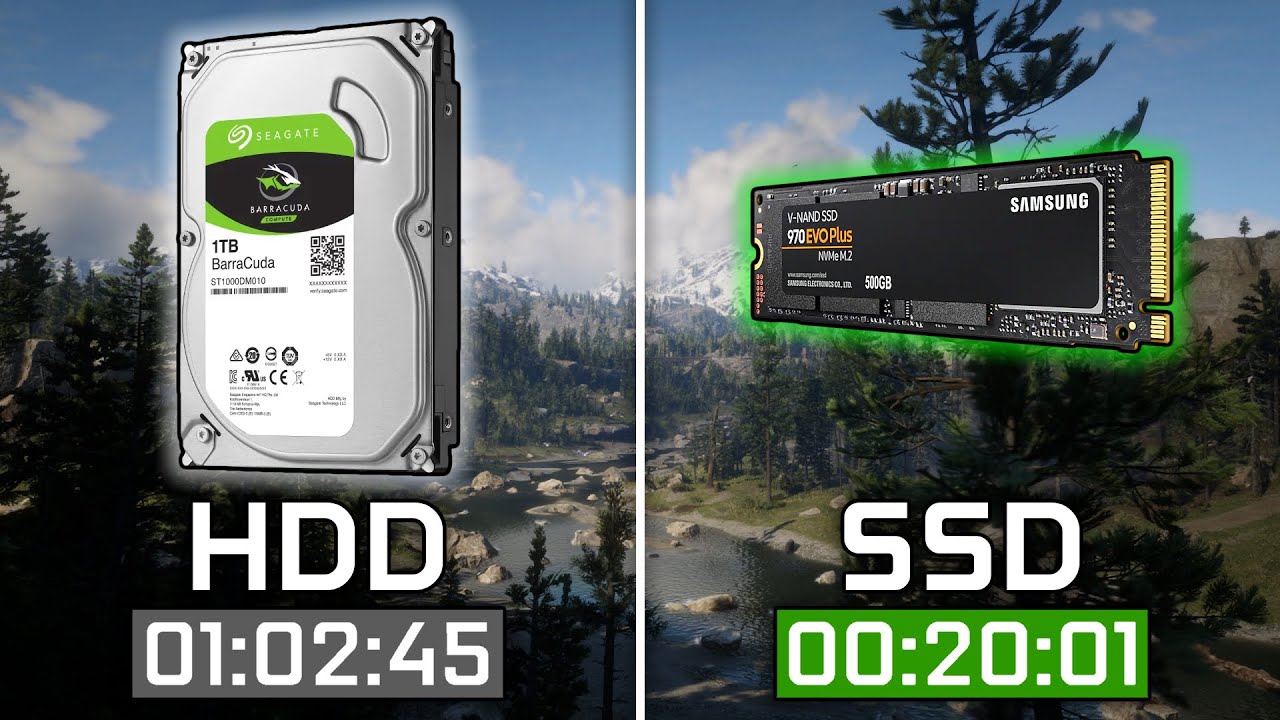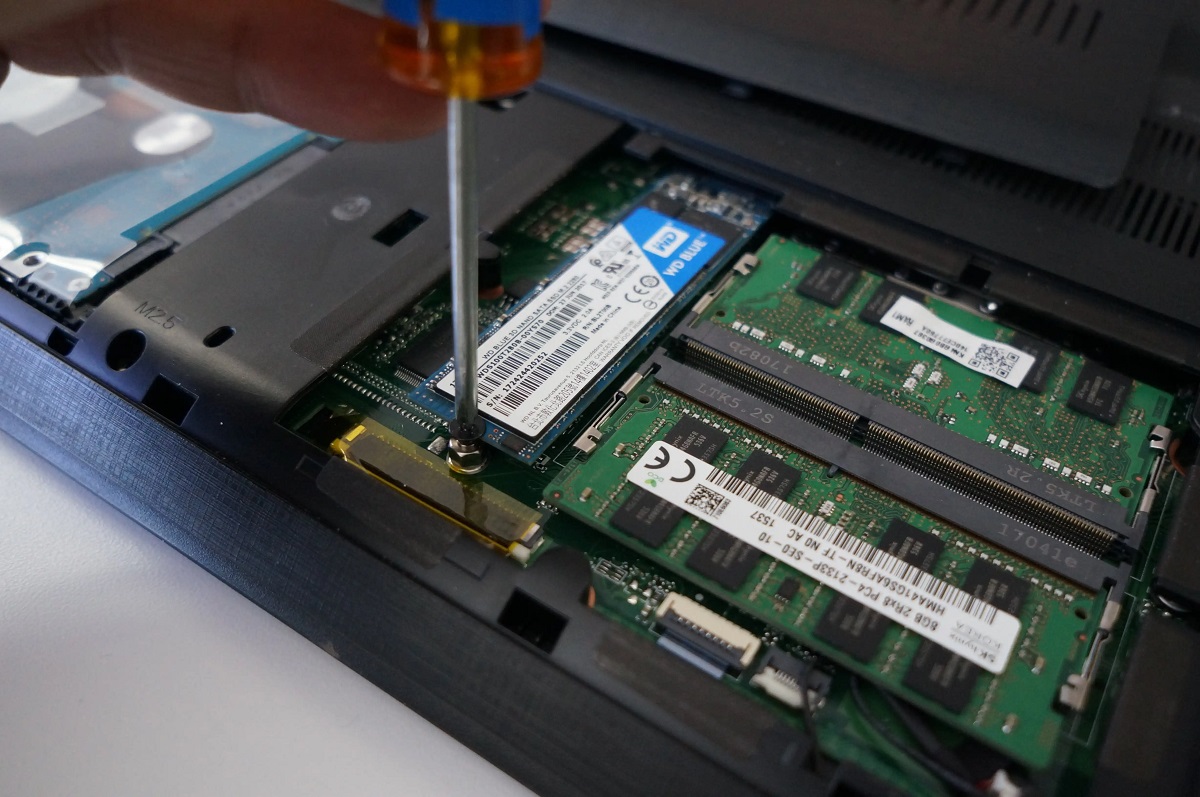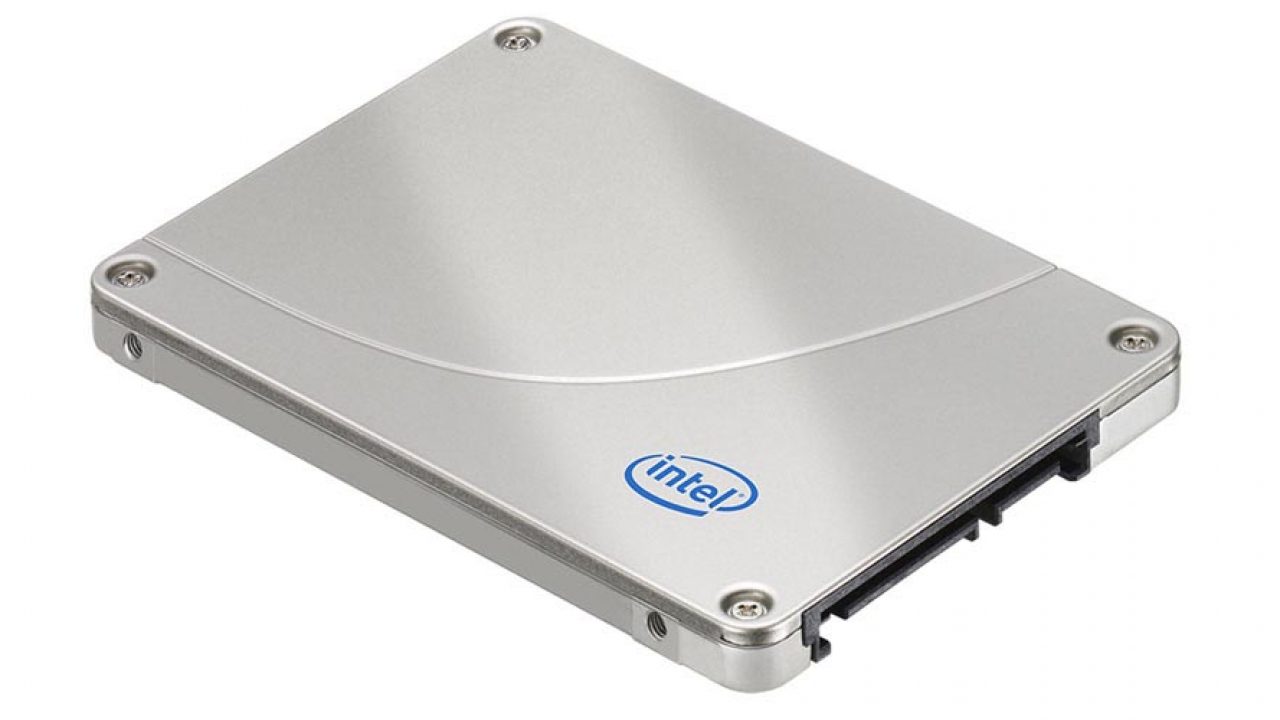SSD vs. HDD: What’s the Difference?
When it comes to storage options for gaming, the choice often boils down to solid-state drives (SSD) and hard disk drives (HDD). While both serve the same purpose of storing your games, there are some crucial differences that can greatly impact your gaming experience.
First and foremost, the main distinction lies in the technology used. HDDs rely on spinning magnetic disks to store and retrieve data, while SSDs utilize flash memory chips. This fundamental difference results in varying performance levels. SSDs have no moving parts, which means faster data access times, reduced latency, and quicker file transfers. On the other hand, HDDs tend to be slower due to the physical movement of the disk’s read/write heads.
Another vital factor to consider is the impact on loading times. SSDs excel in this area, offering significantly faster loading times compared to HDDs. Games stored on an SSD benefit from reduced load times, allowing you to jump into your favorite games swiftly and seamlessly. Additionally, SSDs provide smoother gameplay experiences, with fewer instances of stuttering or lag due to their faster data transfer rates.
However, HDDs still have their own advantages. They tend to have much larger storage capacities compared to SSDs, which can be beneficial if you have an extensive gaming library with numerous large-sized games. HDDs also tend to be more affordable in terms of cost per gigabyte, making them a viable option for budget-conscious gamers.
In summary, while HDDs offer larger storage capacities and cost-effective options, SSDs provide significant performance advantages with their faster data access times and reduced loading times. Ultimately, the choice between the two boils down to weighing your gaming needs, budget, and preferences.
Understanding Game File Sizes
As gaming technology advances, so does the size of game files. Understanding game file sizes is crucial when determining the appropriate storage capacity for your gaming needs.
The size of a game file can vary significantly based on several factors, including the complexity of the game, the level of graphics and audio detail, and the inclusion of downloadable content (DLC). Modern AAA games, known for their high-quality graphics and immersive gameplay, can easily exceed 50GB or even reach 100GB in file size.
Additionally, game updates and patches can further increase file sizes over time. Developers often release updates to enhance gameplay, fix bugs, and introduce new features. These updates can range from a few hundred megabytes to several gigabytes, depending on the changes implemented. It’s essential to consider the potential growth in file size when selecting a storage device for your gaming needs.
An SSD can be highly advantageous when dealing with large game files. Its fast data transfer rates allow for quick installations and seamless loading times. With an SSD, you can install and update games swiftly, minimizing any disruptions to your gaming experience.
On the other hand, HDDs may struggle with handling massive game files efficiently. The slower read and write speeds of HDDs can result in longer installation and loading times. Additionally, as files become fragmented over time, the performance of HDDs can further deteriorate. It’s crucial to consider these factors when deciding between an SSD or HDD for your gaming storage.
Ultimately, understanding game file sizes can help you make an informed decision when selecting a storage device for gaming. Depending on your gaming preferences and the size of your game library, you may opt for an SSD with ample storage capacity to ensure smooth and hassle-free gaming experiences.
Factors to Consider When Choosing an SSD for Gaming
When it comes to selecting an SSD for gaming, there are several important factors to consider. These factors can greatly influence your gaming experience and help you make the right choice for your needs.
The first factor to consider is storage capacity. Gaming files can be sizable, especially with the increasing demand for high-quality graphics and immersive gameplay. Assess your gaming habits and determine the amount of storage you require. It’s recommended to opt for an SSD with ample capacity to accommodate not only your current game library but also future releases and updates.
Next, consider the performance of the SSD. Look for SSDs with fast read and write speeds. These speeds directly impact loading times, game installations, and overall system responsiveness. A higher performance SSD will provide smoother gameplay experiences with quicker file transfers.
Reliability is another critical factor to consider. Ensure the SSD you choose has a good track record for durability and longevity. Look for SSDs from reputable manufacturers with positive customer reviews, as they tend to offer higher-quality products that can withstand the demands of gaming.
Compatibility is also important. Ensure that the SSD you choose is compatible with your gaming system. Check for compatibility with your motherboard, operating system, and any other hardware or software requirements. Compatibility issues can lead to frustrating delays and may hinder your gaming experience.
Price is another consideration. SSDs come in a range of price points, depending on factors such as capacity, performance, and brand. Set a budget for your SSD purchase and consider the balance between cost and features. It’s important to find a device that offers good value for money without compromising on performance and reliability.
Lastly, consider any additional features that may enhance your gaming experience. Some SSDs offer advanced features such as built-in encryption, enhanced power efficiency, and thermal throttling to prevent overheating. These features can add value and convenience to your gaming setup.
By taking into account factors such as storage capacity, performance, reliability, compatibility, price, and additional features, you can make an informed decision when choosing an SSD for gaming. Investing in a quality SSD that meets your requirements will ensure smoother gameplay, faster loading times, and an overall enhanced gaming experience.
Recommended SSD Capacity for Different Types of Gamers
The recommended SSD capacity for gaming can vary depending on the type of gamer you are and your gaming habits. Here are some general guidelines to help you determine the ideal SSD capacity for your gaming needs:
- Casual Gamers: If you are a casual gamer who enjoys playing a limited number of games, a smaller SSD should suffice. A capacity of 250GB to 500GB is typically ample for storing a few AAA titles and indie games.
- Enthusiast Gamers: Enthusiast gamers who have a larger game library and regularly play a variety of games may require a higher capacity SSD. A range of 500GB to 1TB would be a suitable choice, ensuring that you have enough space for multiple games and their updates.
- Professional Gamers and Content Creators: Professional gamers and content creators who frequently record gameplay, stream, or create gaming content may require even more storage capacity. Opting for an SSD with a capacity of 1TB or more is recommended to accommodate the large-sized games and media files associated with their work.
- Future-Proofing: If you want to future-proof your gaming setup and ensure that you have sufficient storage space for upcoming game releases and expansions, consider investing in an SSD with higher capacity. A 2TB SSD or more would provide ample room for storing a vast game library and future updates.
It’s important to note that the recommended capacities mentioned above are based on general guidelines and may vary depending on the specific requirements of your gaming library. Consider factors such as the file sizes of the games you play, any DLC or expansion packs you may install, and the frequency of game updates when determining the ideal SSD capacity.
Additionally, if you have a limited budget, you can still opt for a smaller capacity SSD and use external storage solutions or cloud storage to offload games that you are not currently playing.
By considering your gaming habits, library size, and future needs, you can select an SSD with the appropriate capacity that will provide you with enough storage space for your gaming adventures.
The Benefits of Having Extra SSD Space
Having extra SSD space can bring several benefits to gamers, enhancing their gaming experience and providing additional flexibility. Here are some advantages of having more storage capacity on your SSD:
- Room for More Games: One of the obvious benefits of having extra SSD space is the ability to store and install more games. With larger game file sizes becoming the norm, having ample storage capacity ensures that you can maintain a diverse and extensive game library without constantly needing to delete and reinstall games.
- Smooth Multitasking: With extra SSD space, you can run multiple games or applications simultaneously without experiencing performance issues. This is particularly useful for streamers or content creators who need to have various programs and tools running while gaming.
- Efficient File Management: Having extra space on your SSD allows for better file management. It helps reduce fragmentation and maintain optimal file organization, resulting in faster file access and improved overall system performance.
- Future-Proofing: As games continue to increase in size and complexity, having extra SSD space ensures that you are prepared for future releases and updates. This future-proofs your gaming setup, saving you from the hassle of constantly upgrading or swapping out SSDs as your storage needs grow.
- Flexibility for Content Creation: If you engage in content creation or game modding, extra SSD space provides the flexibility to store multiple versions or variations of games, as well as the freedom to experiment with mods and modifications without worrying about running out of storage.
- Faster Load Times: While SSDs already offer faster load times compared to HDDs, having extra space can further enhance loading speeds. With less data stored on the SSD, the drive can allocate more resources to accessing and loading game files, resulting in even faster load times.
By having extra SSD space, you can not only expand your game library but also improve system performance, facilitate multitasking, accommodate future gaming needs, and enhance your overall gaming and content creation experience. It offers flexibility and convenience, providing you with the freedom to enjoy gaming without constantly worrying about storage limitations.
How to Manage SSD Space with Game Installations
Managing SSD space effectively is essential to ensure that you have enough room for your game installations. Here are some tips to help you make the most of your SSD storage:
- Regularly Clean Up Unnecessary Files: Periodically go through your SSD and remove any unnecessary files, such as old game installations, screenshots, or videos that you no longer need. This will free up space for new game installations.
- Utilize Game Removal Tools or Uninstallers: Instead of manually deleting games, use built-in game removal tools or uninstallers whenever possible. These tools can help remove games more thoroughly and ensure that associated files and registry entries are properly deleted, freeing up additional space.
- Move Less Frequently Played Games: If you have games that you play less frequently, consider moving them to an external storage device or a dedicated game drive. This can free up valuable space on your SSD while still allowing you to access the games when desired.
- Optimize Game Installations: Many games offer customizable installation options, allowing you to select which components or languages to install. Opt for a custom installation and only install what you truly need to save space on your SSD.
- Consider Cloud Saves: Take advantage of cloud save services offered by gaming platforms or third-party services. Storing your game saves in the cloud allows you to remove local copies from your SSD, freeing up space without losing your progress.
- Invest in External Storage: If you find yourself constantly running out of space on your SSD, consider investing in external storage options such as external SSDs or high-capacity external hard drives. This provides you with additional storage space for less frequently played games or media files.
- Monitor Game Updates: Game updates can quickly consume SSD space. Keep an eye on the size of updates and consider deleting older update files to free up SSD space, especially if they are superseded by newer, larger updates.
By implementing these strategies, you can effectively manage SSD space with game installations. Regularly cleaning up unnecessary files, utilizing game removal tools, moving less frequently played games, optimizing installations, considering cloud saves, investing in external storage, and monitoring game updates will help ensure that you have enough SSD space for your favorite games while maintaining optimal system performance.
Upgrading Your SSD for Future Gaming Needs
As technology evolves and games become more demanding, upgrading your SSD can be a wise investment to accommodate future gaming needs. Here are some reasons why upgrading your SSD is beneficial:
- Increased Storage Capacity: Upgrading your SSD allows you to enjoy larger storage capacities, providing ample space for your expanding game library. With higher capacity SSDs available, you can store more games, DLCs, patches, and updates without worrying about running out of storage.
- Improved Performance: Upgrading to a faster and more modern SSD can significantly improve game loading times, reduce stuttering, and enhance overall system performance. Newer SSD models often offer faster read and write speeds, ensuring smoother gameplay experiences and quicker file transfers.
- Enhanced Compatibility: Upgrading to a newer SSD can improve compatibility with the latest gaming platforms or technologies. As new standards and protocols emerge, older SSDs may not support these advancements, resulting in potential issues or limitations.
- Future-Proofing: By upgrading your SSD, you can future-proof your gaming setup. Investing in a high-quality, larger capacity SSD can provide you with enough storage space and performance capabilities to meet the demands of upcoming game releases and expansions.
- Improved Energy Efficiency: Newer SSD models often feature improved energy efficiency, consuming less power while delivering better performance. This can extend your laptop’s battery life or reduce overall power consumption, making it a worthwhile upgrade for mobile gamers.
- Advanced Features: Upgrading your SSD can introduce new features and technologies that enhance your gaming experience. For example, some SSDs offer hardware encryption or advanced thermal management systems to maintain optimal temperatures during prolonged gaming sessions.
- Seamless Transition: Thanks to the standardized form factor of SSDs, upgrading is generally a simple process. If you already have an SSD installed, swapping it out for a new one can be as easy as cloning your existing drive or reinstalling your operating system and games.
When considering an upgrade, research different SSD models, compare their specifications, and read reviews to find the best option for your needs. Consider factors such as capacity, performance, reliability, and price to ensure that the upgraded SSD meets both your current and future gaming requirements.
By upgrading your SSD, you can unlock the benefits of increased storage capacity, improved performance, enhanced compatibility, future-proofing, energy efficiency, advanced features, and a seamless transition. This investment will ensure that you can enjoy the best gaming experience possible while staying prepared for the gaming advancements of tomorrow.
Summary and Final Thoughts
Choosing the right SSD for gaming is crucial in ensuring optimal performance and storage capacity. SSDs offer significant advantages over traditional hard disk drives, with faster loading times, smoother gameplay experiences, and quicker file transfers. However, there are important factors to consider when selecting an SSD, such as storage capacity, performance, reliability, compatibility, and price.
For different types of gamers, the recommended SSD capacity varies. Casual gamers may find a smaller SSD sufficient, while enthusiast gamers and professional gamers/content creators may need larger capacities to accommodate a larger game library and media files. Future-proofing your gaming setup by opting for a higher capacity SSD is also beneficial.
Having extra SSD space brings several advantages, including room for more games, efficient file management, smoother multitasking, and future flexibility. Implementing proper SSD management techniques, such as regular file cleanup, utilizing uninstallers, and moving less frequently played games, can help maximize your SSD space and improve overall performance.
Upgrading your SSD for future gaming needs can provide increased storage capacity, improved performance, enhanced compatibility, and advanced features. It ensures that you’re equipped to handle the demands of upcoming games, expansions, and updates. Upgrading is usually a straightforward process and can be seamlessly integrated into your gaming setup.
In summary, choosing the right SSD, managing SSD space effectively, and considering future upgrades are key elements to optimize your gaming experience. By selecting an SSD suited to your needs, implementing space management strategies, and planning for future gaming requirements, you can enjoy smoother gameplay, faster load times, and storage flexibility for your expanding game library.
With these considerations in mind, embark on your gaming journey equipped with the right SSD, and immerse yourself in the world of gaming with seamless performance and ample storage space.

























